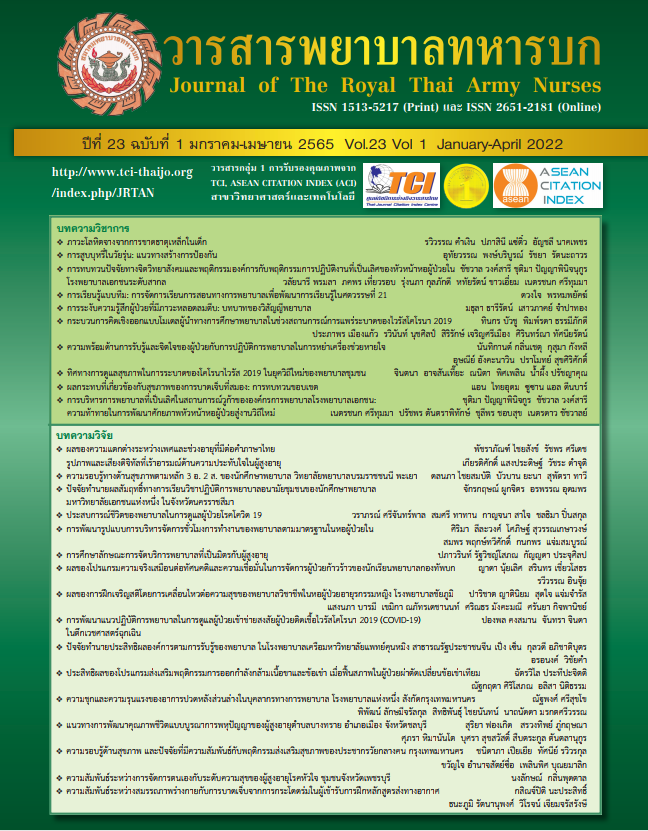The Effects of Social Skills Training Program to Promote Social Skills of Preschool Children with Autism Spectrum Disorder
Keywords:
social skills, social skills training, preschool children with Autism Spectrum DisorderAbstract
This research is a quasi-experimental research aimed to study the effect of social skills training program in developing social skills among preschool children with Autism Spectrum Disorder (ASD). The sample consisted of 13 preschool children with ASD age 2-6 years, who were admitted at Rajanukul Development Promotion Center (Khlong Kum). Purposive sampling method was used to recruit the sample according to inclusion criteria. The children participated in the program for 1.25 hours per day, 5 days a week, for 12 weeks. The program included social stories, snack time, and circle time. Data were collected using demographic questionnaire and Social Skills Assessment for young children with autism. Descriptive statistics and Wilcoxon signed-rank test were used for data analysis.
The findings revealed that the preschool children with ASD who received the social skills training program had a total score of social skills deficit and subscores of social skills deficit decreased in 3 areas: self-regulation, social activities, and social communication. When comparing the rank of total score and subscores of social skills deficit before and after receiving the program, the total score of social skills deficit was statistically significant lower after receiving the program (Z = -3.185, p<.05). The results indicated the effectiveness of the social skills training program on enhancing social skills development in preschool children with ASD. Implementing this social skills intervention program in developmental centers, hospitals, and inclusive education is recommended in order to develop social skills in preschool children with ASD.
Downloads
References
American Psychiatric Association. Diagnostic and statistical manual of mental disorders- 5 (5th). Arlington: American Psychiatric Publishing; 2013.
World Health Organization. Health Equity. Geneva; 2019.
Department of Mental Health, Ministry of Public Health. Reports of patients receiving visual psychiatric services across the country Fiscal Year 2018: Department of Mental Health, Ministry of Public Health; 2018. (in Thai).
Rajanukul Institute of Medicine Statistics. Inpatient and outpatient statistics report Rajanukul Institute. Bangkok: Rajanukul Institute. 2019. (in Thai).
Sriwiset K, Sararatana A. Social skills development for pre-primary students with autism in inclusive schools by social stories approach. Journal of Education Khon Kaen University. 2009; 32(4): 23-31. (in Thai).
Tawankanjanachot N. Social skills of school age children with autism spectrum disorders. The journal of psychiatric nursing and mental health. 2016; 30(2): 1-19. (in Thai).
Kiep M, Spek A, Hoeben L. Mindfulness-based therapy in adults with an autism spectrum disorder: Do treatment effects last? Mindfulness. 2015; 6(3): 637-644.
Bonis S. Stress and parents of children with autism: A review of literature. Issues in mental health nursing. 2016; 37(3): 153-163.
Tadsing S, Somprasert C, Siriumpunkul P. The effects of an integrated stress management program on the stress management skills of mothers of children with autism spectrum disorder. Journal of The Royal Thai Army Nurses. 2017; 18 (Supp): 284-291. (in Thai).
Kotphat N, Kowittaya M. Effects of organizing non-formal education activities based on place-based education on social skills in adolescent with autism spectrum disorders. An Online Journal of Education. 2017; 12(2): 401- 415.
Gunning C, Holloway J, Fee B, Breathnach Ó, Bergin C, Greene I, Bheoláin R. A systematic review of generalization and maintenance outcomes of social skills intervention for preschool children with autism spectrum disorder. Review Journal of Autism and Developmental Disorders. 2019; 6: 1-28.
Holloway J, Healy O, Dwyer M, Lydon S. Social Skills Deficits in Children with Autism Spectrum Disorders: Evidence Based Interventions. Comprehensive Guide to Autism. 2014; 1133-1158.
Vygotsky L. Thought and Language. Cambridge: MIT Press; 1986.
Singsathorn D, Suksong W, Permsirivanich W. Effects of development promotion based on DIR/floortime techniques in autistic children, Queen Savang Vadhana Memorial Hospital. Journal of Phrapokklao Nursing College. 2016;27(Suppl.1): 104-122.
Chester M, Richdale A, McGillivray J. Group-based social skills training with play for children on the autism spectrum. Journal of autism and developmental disorders. 2019; 49(6): 2231-2242.
MacCormack J, Matheson I, Hutchinson N. An exploration of a community-based LEGO social-skills program for youth with autism spectrum disorder. Exceptionality Education International. 2015; 25(3): 13-32.
Qi C, Barton E, Collier M, Montoya C. A systematic review of effects of social stories interventions for individuals with autism spectrum disorder. Focus on Autism and Other Developmental Disabilities. 2018; 33(1): 25-34.
Gauvreau A. Using “Snack Talk” to support social communication in inclusive preschool classrooms. Young exceptional children. 2019; 22(4): 187-197.
Papacek, A, Chai Z, Green, K. Play and social interaction strategies for young children with autism spectrum disorder in inclusive preschool settings. Young exceptional children. 2016; 19(3): 3-17.
Therrien M, Light J. Promoting peer interaction for preschool children with complex communication needs and autism spectrum disorder. American Journal of SpeechLanguage Pathology. 2018; 27(1): 207-221.
Downloads
Published
How to Cite
Issue
Section
License
Copyright (c) 2022 Journal of The Royal Thai Army Nurses

This work is licensed under a Creative Commons Attribution-NonCommercial-NoDerivatives 4.0 International License.
บทความหรือข้อคิดเห็นใดใดที่ปรากฏในวารสารพยาบาลทหารบกเป็นวรรณกรรมของผู้เขียน ซึ่งบรรณาธิการหรือสมาคมพยาบาลทหารบก ไม่จำเป็นต้องเห็นด้วย
บทความที่ได้รับการตีพิมพ์เป็นลิขสิทธิ์ของวารสารพยาบาลทหารบก
The ideas and opinions expressed in the Journal of The Royal Thai Army Nurses are those of the authors and not necessarily those
of the editor or Royal Thai Army Nurses Association.






